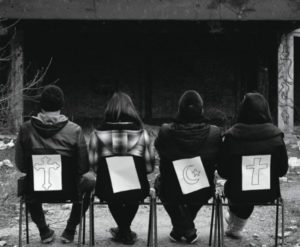An Orthodox Christian Discusses the Complexity of Peace and Dialogue
An interview with co-founder and current advisor to the European House Vukovar (Europski Dom Vukovar) Dr. Ljiljana Gehrecke
 The fall of Vukovar—a city in the far eastern reaches of Croatia just shy of Serbia’s border—is Croatia’s quintessential collective memory of their homeland war’s devastation and horror. An important cultural and industrial center before the war, it was also a prime location for a power struggle after Croatia declared its independence in 1991. The Yugoslav People’s Army and Serbian paramilitary forces surrounded the town in a horrific three-month siege and bombardment: thousands were either killed, wounded, executed, or forced to evacuate, and 85 percent of the buildings were destroyed. The war ended in 1995, and in 1998, Croatians began returning to Vukovar.1 Today, Serbians are in the minority, and although substantial gains have been made towards the cultivation of a peaceful society, divisions and deep wounds remain.
The fall of Vukovar—a city in the far eastern reaches of Croatia just shy of Serbia’s border—is Croatia’s quintessential collective memory of their homeland war’s devastation and horror. An important cultural and industrial center before the war, it was also a prime location for a power struggle after Croatia declared its independence in 1991. The Yugoslav People’s Army and Serbian paramilitary forces surrounded the town in a horrific three-month siege and bombardment: thousands were either killed, wounded, executed, or forced to evacuate, and 85 percent of the buildings were destroyed. The war ended in 1995, and in 1998, Croatians began returning to Vukovar.1 Today, Serbians are in the minority, and although substantial gains have been made towards the cultivation of a peaceful society, divisions and deep wounds remain.
In 2013, hostilities resurfaced in Vukovar after the Croatian government decided, in accordance with its minority rights legislation, to promote the use of the Serbian language in areas where the Serbian minority was greater than a third. Although Serbian and Croatian are very similar languages—in fact called “Serbo-Croatian” during the time of Yugoslavia—Serbian is written in Cyrillic while Croatian is written with a Latin alphabet. Protests and resistance quickly formed in Vukovar against the possibility of having Cyrillic appear on administrative signs, climaxing when hundreds of people, primarily veterans and survivors of the war, gathered to destroy the newly placed signs. By December, Croatian protesters had collected over 680,000 signatures in order to force a referendum calling for reformation of the minority language rights legislation, although the Croatian government is staunchly promoting the minority rights in accordance with their recent European Union entrance.2
 Despite those working against peace, many have developed and are developing initiatives to facilitate dialogue, tolerance, and relationships across religious and ethnic lines. The European House (EH), founded in Vukovar in 2000, states part of their mission as “initiating and supporting the overall socio-economic development of Vukovar in order to anchor peace in the region.”3 One of their specific objectives in relation to this mission is to facilitate mutual trust, understanding, and tolerance between ethnic, religious, and political groups. Ljiljana Gehrecke, an Orthodox Christian of German descent, was born and raised in Vukovar and remembers how good life was before the war—there were no differences between the Serbs and Croats. But changes were ushered in when “politicians came to tell them [the citizens] that they cannot live together. It is easy to manipulate uneducated and frightened people,” she said.
Despite those working against peace, many have developed and are developing initiatives to facilitate dialogue, tolerance, and relationships across religious and ethnic lines. The European House (EH), founded in Vukovar in 2000, states part of their mission as “initiating and supporting the overall socio-economic development of Vukovar in order to anchor peace in the region.”3 One of their specific objectives in relation to this mission is to facilitate mutual trust, understanding, and tolerance between ethnic, religious, and political groups. Ljiljana Gehrecke, an Orthodox Christian of German descent, was born and raised in Vukovar and remembers how good life was before the war—there were no differences between the Serbs and Croats. But changes were ushered in when “politicians came to tell them [the citizens] that they cannot live together. It is easy to manipulate uneducated and frightened people,” she said.
In 2004, the EH began a process of building cooperation with various religious groups: Catholic, Orthodox, Pentecostal, Adventist, Greek Catholic, and the Islamic community. When Ljiljana first invited all the leaders to meet together, she was afraid no one would come. To prepare for the occasion, she visited each of the religious communities to listen to their sermons. “The sermons were not good,” she said. “Each group was telling their members to be in community [socialize] only with their own group.” Much to her surprise, representatives from each religious tradition did come to the event, although none of the leaders greeted each other when they walked in and even refused to look at each other. To begin that first meeting around the table, Ljiljana asked each religious leader to take a five-minute period of silence and pray in his own way that the meeting would be positive. The meeting itself was productive as the leaders all agreed that they should work against division between the religious communities. The end of the meeting was telling, however, as everyone quickly slipped out afterwards, ignoring the food spread that was waiting for them.
As the meetings progressed, taking place every two months, Ljiljana recounted how they began to form relationships with each other, talking and joking as if they belonged to one community. They held roundtables where each religious leader was able to share about his own tradition. For seven years running, they held a concert where religious groups would sing their own songs and they also held ecumenical prayer meetings. Until around 2010, the cooperation was continuing to grow, and every year on Europe Day, the leaders would come to a prominent hotel and meet each other. All the citizens could walk by the big widows and see their religious leaders laughing and talking to one another.
Three years ago, politics began seeping back into the mix—that is, the focus began to drift away from open engagement back towards favor of one’s own religious and/or political interest. First, the Catholic priest started saying he didn’t have time to come to the gatherings anymore, and then the Orthodox representatives decided not to come if the Catholics were not coming. The Muslim and evangelical groups continued, but this year, out of the eight religious groups in Vukovar, six did not attend. The only two that came were from evangelical groups.
Certainly, this is now exacerbated by the rising tension from the language script debates. In Ljiljana’s view, ordinary citizens want to move beyond this, but the social pressure is very high to conform to one’s particular ethnic group—in general, if one is Croat and therefore Catholic, there is pressure to be against the Cyrillic. If one is Serbian and therefore Orthodox, there is pressure to support the Cyrillic signs. According to Ljiljana, some religious leaders were actually encouraging the protests against the use of the Cyrillic letters.
Ljiljana believes that the religious leaders should be providing appropriate leadership to mitigate this conflict:
Without a spiritual approach to the conflict, there will be no resolution. The politicians can never resolve the issue of reconciliation and forgiveness and neither can the social scientists. Because forgiveness is a [matter] of the spirit. The power for reconciliation and forgiveness can only be found on the spiritual path. Without forgiveness and reconciliation, there is no life in Vukovar. And the leading role here should be played by the church groups and leaders.
Three and a half years ago, the two evangelical churches who are still attending the interfaith gatherings started and continue to facilitate a project called the “Valley of Tears to the Valley of Blessings.” Once a month, they organize a night of poetry and song, using the arts as a way to build bridges and facilitate relationships. The monthly gatherings have grown to around 100 people, including people from each of the religious and ethnic groups.
“A kingdom divided cannot stand,” Ljiljana concluded. “There is not a family who can work well when there is division. All citizens in Vukovar want to live in peace and live well…. A peacemaker is very important. We are not doing it because we are thinking of the later kingdom but because the kingdom is in our hearts already.”
ENDNOTES
1Barbara Matejcic, “Vukovar Still Imprisoned by Its Bloody Past,” BalkanInsight, February 21, 2012, http://www.balkaninsight.com/en/article/vukovar-still-imprisoned-by-its-bloody-past; or Laura Silber and Allan Little, Yugoslavia: The Death of a Nation (New York: Penguin Group, 1996).
2Boris Pavelic and Josip Ivanovic, “Croatia: Serbian Language Dispute Creates Discord,” BalkanInsight, December 26, 2013, http://www.balkaninsight.com/en/article/croatia-serbian-language-dispute-sparks-discord.
3See the Europski Dom Vukovar [European House Vukovar] website, http://www.edvu.org/spip/spip.php?rubrique6 (accessed January 7, 2013).


